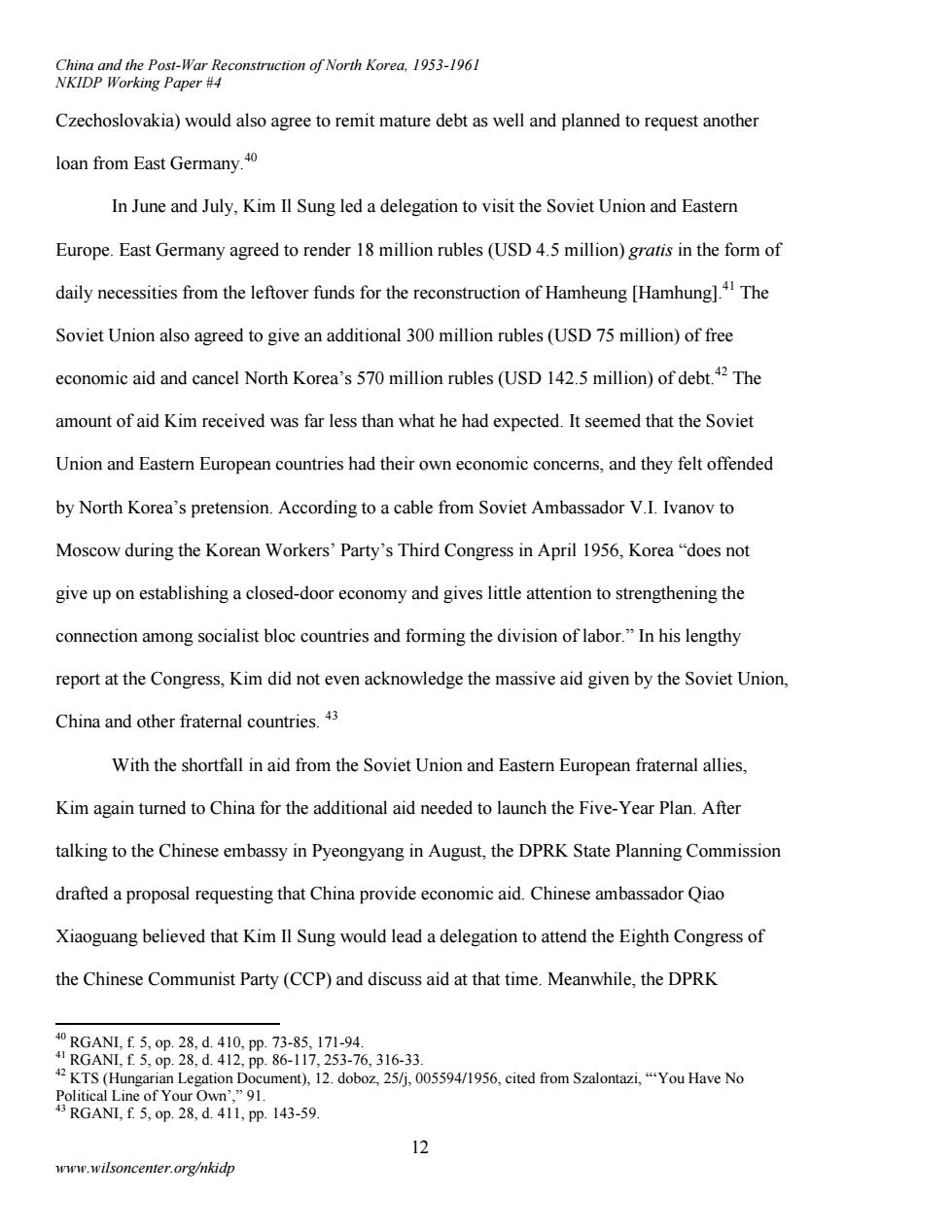
China and the Post-War Reconstruction of North Korea,1953-1961 NKIDP Working Paper #4 Czechoslovakia)would also agree to remit mature debt as well and planned to request another loan from East Germany.40 In June and July,Kim Il Sung led a delegation to visit the Soviet Union and Eastern Europe.East Germany agreed to render 18 million rubles(USD 4.5 million)gratis in the form of daily necessities from the leftover funds for the reconstruction of Hamheung [Hamhung].The Soviet Union also agreed to give an additional 300 million rubles(USD 75 million)of free economic aid and cancel North Korea's 570 million rubles(USD 142.5 million)of debt.2 The amount of aid Kim received was far less than what he had expected.It seemed that the Soviet Union and Eastern European countries had their own economic concerns,and they felt offended by North Korea's pretension.According to a cable from Soviet Ambassador V.I.Ivanov to Moscow during the Korean Workers'Party's Third Congress in April 1956,Korea"does not give up on establishing a closed-door economy and gives little attention to strengthening the connection among socialist bloc countries and forming the division of labor."In his lengthy report at the Congress,Kim did not even acknowledge the massive aid given by the Soviet Union, China and other fraternal countries.43 With the shortfall in aid from the Soviet Union and Eastern European fraternal allies, Kim again turned to China for the additional aid needed to launch the Five-Year Plan.After talking to the Chinese embassy in Pyeongyang in August,the DPRK State Planning Commission drafted a proposal requesting that China provide economic aid.Chinese ambassador Qiao Xiaoguang believed that Kim Il Sung would lead a delegation to attend the Eighth Congress of the Chinese Communist Party(CCP)and discuss aid at that time.Meanwhile,the DPRK 40 RGANI,E5,op.28,d.410,pp.73-85,171-94, 41RGAN1,f5,op.28,d.412,pp.86-117,253-76,316-33. KTS(Hungarian Legation Document),12.doboz,5/j005594/1956,cited from Szalontazi,You Have No Political Line of Your Own',"91. 43 RGANI,f5,op.28,d.41l,pp.143-59 12 www.wilsoncenter.org/nkidp
China and the Post-War Reconstruction of North Korea, 1953-1961 NKIDP Working Paper #4 12 www.wilsoncenter.org/nkidp Czechoslovakia) would also agree to remit mature debt as well and planned to request another loan from East Germany.40 In June and July, Kim Il Sung led a delegation to visit the Soviet Union and Eastern Europe. East Germany agreed to render 18 million rubles (USD 4.5 million) gratis in the form of daily necessities from the leftover funds for the reconstruction of Hamheung [Hamhung]. 41 The Soviet Union also agreed to give an additional 300 million rubles (USD 75 million) of free economic aid and cancel North Korea’s 570 million rubles (USD 142.5 million) of debt.42 The amount of aid Kim received was far less than what he had expected. It seemed that the Soviet Union and Eastern European countries had their own economic concerns, and they felt offended by North Korea’s pretension. According to a cable from Soviet Ambassador V.I. Ivanov to Moscow during the Korean Workers’ Party’s Third Congress in April 1956, Korea “does not give up on establishing a closed-door economy and gives little attention to strengthening the connection among socialist bloc countries and forming the division of labor.” In his lengthy report at the Congress, Kim did not even acknowledge the massive aid given by the Soviet Union, China and other fraternal countries. 43 With the shortfall in aid from the Soviet Union and Eastern European fraternal allies, Kim again turned to China for the additional aid needed to launch the Five-Year Plan. After talking to the Chinese embassy in Pyeongyang in August, the DPRK State Planning Commission drafted a proposal requesting that China provide economic aid. Chinese ambassador Qiao Xiaoguang believed that Kim Il Sung would lead a delegation to attend the Eighth Congress of the Chinese Communist Party (CCP) and discuss aid at that time. Meanwhile, the DPRK 40 RGANI, f. 5, op. 28, d. 410, pp. 73-85, 171-94. 41 RGANI, f. 5, op. 28, d. 412, pp. 86-117, 253-76, 316-33. 42 KTS (Hungarian Legation Document), 12. doboz, 25/j, 005594/1956, cited from Szalontazi, “‘You Have No Political Line of Your Own’,” 91. 43 RGANI, f. 5, op. 28, d. 411, pp. 143-59
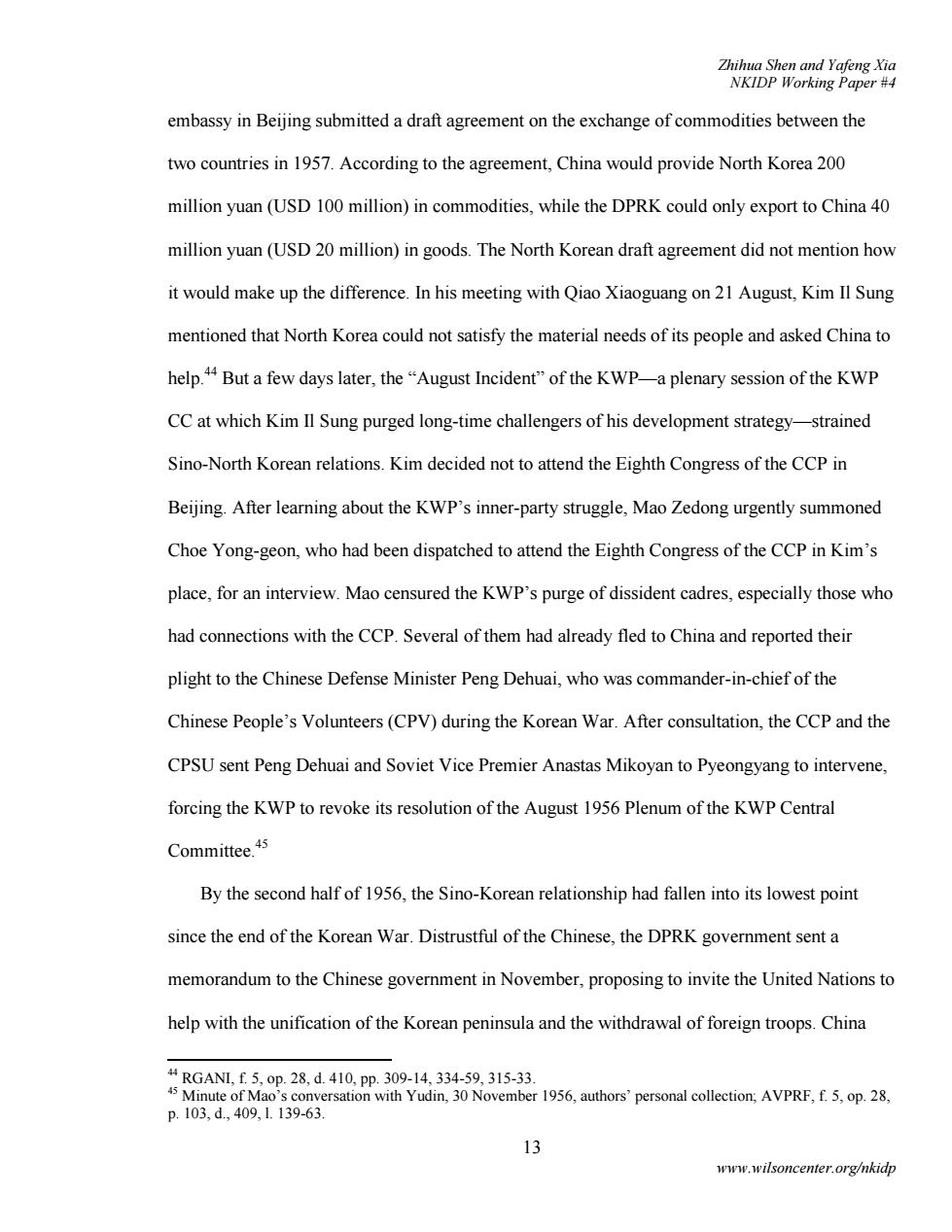
Zhihua Shen and Yafeng Xia NKIDP Working Paper #4 embassy in Beijing submitted a draft agreement on the exchange of commodities between the two countries in 1957.According to the agreement,China would provide North Korea 200 million yuan (USD 100 million)in commodities,while the DPRK could only export to China 40 million yuan(USD 20 million)in goods.The North Korean draft agreement did not mention how it would make up the difference.In his meeting with Qiao Xiaoguang on 21 August,Kim Il Sung mentioned that North Korea could not satisfy the material needs of its people and asked China to help.4 But a few days later,the"August Incident"of the KWP-a plenary session of the KWP CC at which Kim Il Sung purged long-time challengers of his development strategy-strained Sino-North Korean relations.Kim decided not to attend the Eighth Congress of the CCP in Beijing.After learning about the KWP's inner-party struggle,Mao Zedong urgently summoned Choe Yong-geon,who had been dispatched to attend the Eighth Congress of the CCP in Kim's place,for an interview.Mao censured the KWP's purge of dissident cadres,especially those who had connections with the CCP.Several of them had already fled to China and reported their plight to the Chinese Defense Minister Peng Dehuai,who was commander-in-chief of the Chinese People's Volunteers(CPV)during the Korean War.After consultation,the CCP and the CPSU sent Peng Dehuai and Soviet Vice Premier Anastas Mikoyan to Pyeongyang to intervene, forcing the KWP to revoke its resolution of the August 1956 Plenum of the KWP Central Committee.45 By the second half of 1956,the Sino-Korean relationship had fallen into its lowest point since the end of the Korean War.Distrustful of the Chinese,the DPRK government sent a memorandum to the Chinese government in November,proposing to invite the United Nations to help with the unification of the Korean peninsula and the withdrawal of foreign troops.China 4RGAN,E5,op.28,d.410,pp.309-14,334-59,315-33. 45 Minute of Mao's conversation with Yudin,30 November 1956,authors'personal collection,AVPRF,f.5,op.28, p.103,d.,409,1.139-63. 13 www.wilsoncenter.org/nkidp
Zhihua Shen and Yafeng Xia NKIDP Working Paper #4 13 www.wilsoncenter.org/nkidp embassy in Beijing submitted a draft agreement on the exchange of commodities between the two countries in 1957. According to the agreement, China would provide North Korea 200 million yuan (USD 100 million) in commodities, while the DPRK could only export to China 40 million yuan (USD 20 million) in goods. The North Korean draft agreement did not mention how it would make up the difference. In his meeting with Qiao Xiaoguang on 21 August, Kim Il Sung mentioned that North Korea could not satisfy the material needs of its people and asked China to help.44 But a few days later, the “August Incident” of the KWP—a plenary session of the KWP CC at which Kim Il Sung purged long-time challengers of his development strategy—strained Sino-North Korean relations. Kim decided not to attend the Eighth Congress of the CCP in Beijing. After learning about the KWP’s inner-party struggle, Mao Zedong urgently summoned Choe Yong-geon, who had been dispatched to attend the Eighth Congress of the CCP in Kim’s place, for an interview. Mao censured the KWP’s purge of dissident cadres, especially those who had connections with the CCP. Several of them had already fled to China and reported their plight to the Chinese Defense Minister Peng Dehuai, who was commander-in-chief of the Chinese People’s Volunteers (CPV) during the Korean War. After consultation, the CCP and the CPSU sent Peng Dehuai and Soviet Vice Premier Anastas Mikoyan to Pyeongyang to intervene, forcing the KWP to revoke its resolution of the August 1956 Plenum of the KWP Central Committee.45 By the second half of 1956, the Sino-Korean relationship had fallen into its lowest point since the end of the Korean War. Distrustful of the Chinese, the DPRK government sent a memorandum to the Chinese government in November, proposing to invite the United Nations to help with the unification of the Korean peninsula and the withdrawal of foreign troops. China 44 RGANI, f. 5, op. 28, d. 410, pp. 309-14, 334-59, 315-33. 45 Minute of Mao’s conversation with Yudin, 30 November 1956, authors’ personal collection; AVPRF, f. 5, op. 28, p. 103, d., 409, l. 139-63
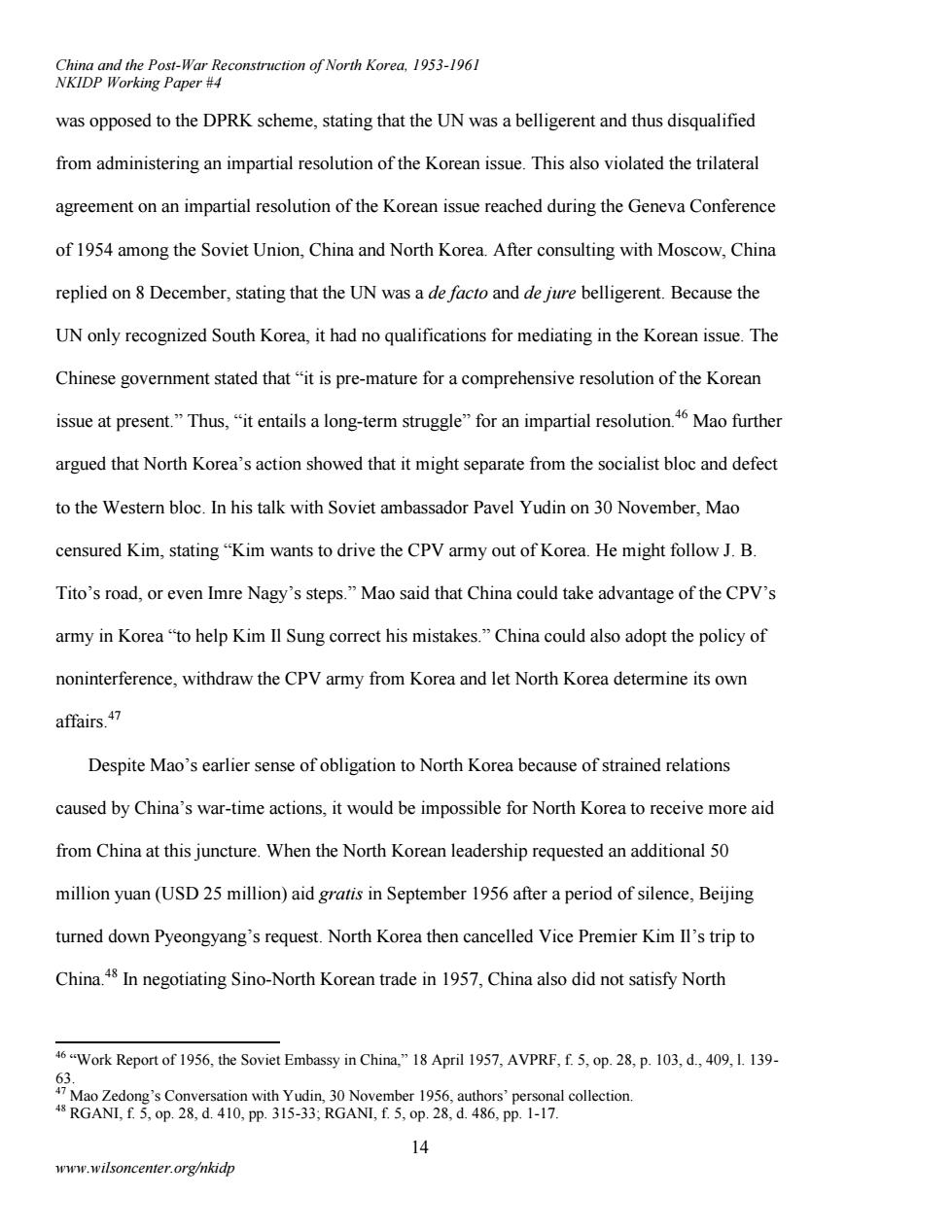
China and the Post-War Reconstruction of North Korea,1953-1961 NKIDP Working Paper #4 was opposed to the DPRK scheme,stating that the UN was a belligerent and thus disqualified from administering an impartial resolution of the Korean issue.This also violated the trilateral agreement on an impartial resolution of the Korean issue reached during the Geneva Conference of 1954 among the Soviet Union,China and North Korea.After consulting with Moscow,China replied on 8 December,stating that the UN was a de facto and de jure belligerent.Because the UN only recognized South Korea,it had no qualifications for mediating in the Korean issue.The Chinese government stated that"it is pre-mature for a comprehensive resolution of the Korean issue at present."Thus,"it entails a long-term struggle"for an impartial resolution.46 Mao further argued that North Korea's action showed that it might separate from the socialist bloc and defect to the Western bloc.In his talk with Soviet ambassador Pavel Yudin on 30 November,Mao censured Kim,stating"Kim wants to drive the CPV army out of Korea.He might follow J.B. Tito's road,or even Imre Nagy's steps."Mao said that China could take advantage of the CPV's army in Korea"to help Kim Il Sung correct his mistakes."China could also adopt the policy of noninterference,withdraw the CPV army from Korea and let North Korea determine its own affairs.47 Despite Mao's earlier sense of obligation to North Korea because of strained relations caused by China's war-time actions,it would be impossible for North Korea to receive more aid from China at this juncture.When the North Korean leadership requested an additional 50 million yuan(USD 25 million)aid gratis in September 1956 after a period of silence,Beijing turned down Pyeongyang's request.North Korea then cancelled Vice Premier Kim Il's trip to China.48 In negotiating Sino-North Korean trade in 1957,China also did not satisfy North 46"Work Report of 1956,the Soviet Embassy in China,"18 April 1957,AVPRF,f.5,op.28,p.103,d.,409,1.139- 63. 47 Mao Zedong's Conversation with Yudin,30 November 1956,authors'personal collection. 48 RGANI,f5,op.28,d.410,pp.315-33,RGANI,f5,op.28,d.486,Pp.1-l7. 14 www.wilsoncenter.org/nkidp
China and the Post-War Reconstruction of North Korea, 1953-1961 NKIDP Working Paper #4 14 www.wilsoncenter.org/nkidp was opposed to the DPRK scheme, stating that the UN was a belligerent and thus disqualified from administering an impartial resolution of the Korean issue. This also violated the trilateral agreement on an impartial resolution of the Korean issue reached during the Geneva Conference of 1954 among the Soviet Union, China and North Korea. After consulting with Moscow, China replied on 8 December, stating that the UN was a de facto and de jure belligerent. Because the UN only recognized South Korea, it had no qualifications for mediating in the Korean issue. The Chinese government stated that “it is pre-mature for a comprehensive resolution of the Korean issue at present.” Thus, “it entails a long-term struggle” for an impartial resolution.46 Mao further argued that North Korea’s action showed that it might separate from the socialist bloc and defect to the Western bloc. In his talk with Soviet ambassador Pavel Yudin on 30 November, Mao censured Kim, stating “Kim wants to drive the CPV army out of Korea. He might follow J. B. Tito’s road, or even Imre Nagy’s steps.” Mao said that China could take advantage of the CPV’s army in Korea “to help Kim Il Sung correct his mistakes.” China could also adopt the policy of noninterference, withdraw the CPV army from Korea and let North Korea determine its own affairs.47 Despite Mao’s earlier sense of obligation to North Korea because of strained relations caused by China’s war-time actions, it would be impossible for North Korea to receive more aid from China at this juncture. When the North Korean leadership requested an additional 50 million yuan (USD 25 million) aid gratis in September 1956 after a period of silence, Beijing turned down Pyeongyang’s request. North Korea then cancelled Vice Premier Kim Il’s trip to China.48 In negotiating Sino-North Korean trade in 1957, China also did not satisfy North 46 “Work Report of 1956, the Soviet Embassy in China,” 18 April 1957, AVPRF, f. 5, op. 28, p. 103, d., 409, l. 139- 63. 47 Mao Zedong’s Conversation with Yudin, 30 November 1956, authors’ personal collection. 48 RGANI, f. 5, op. 28, d. 410, pp. 315-33; RGANI, f. 5, op. 28, d. 486, pp. 1-17
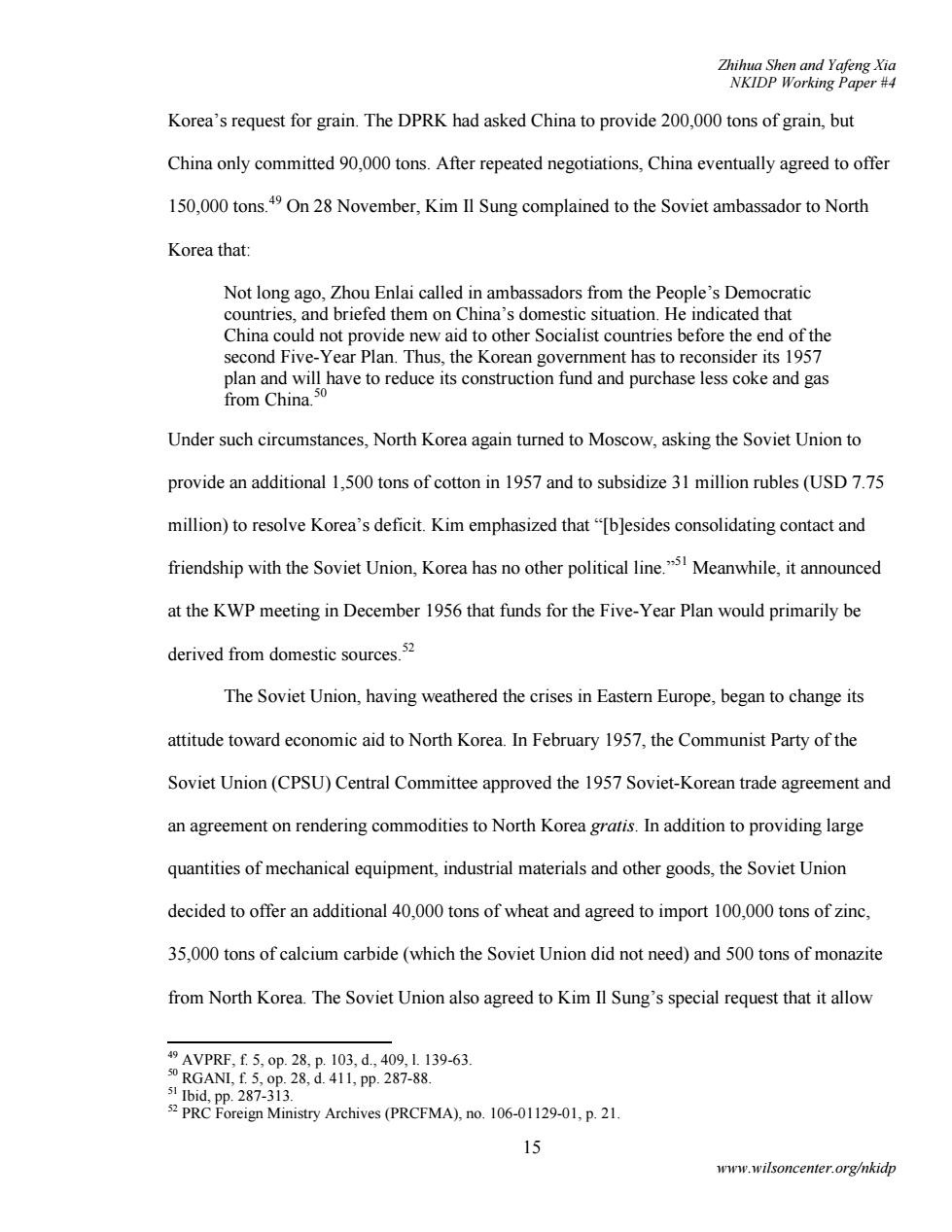
Zhihua Shen and Yafeng Xia NKIDP Working Paper #4 Korea's request for grain.The DPRK had asked China to provide 200,000 tons of grain,but China only committed 90,000 tons.After repeated negotiations,China eventually agreed to offer 150,000 tons.49 On 28 November,Kim Il Sung complained to the Soviet ambassador to North Korea that: Not long ago,Zhou Enlai called in ambassadors from the People's Democratic countries,and briefed them on China's domestic situation.He indicated that China could not provide new aid to other Socialist countries before the end of the second Five-Year Plan.Thus,the Korean government has to reconsider its 1957 plan and will have to reduce its construction fund and purchase less coke and gas from China.50 Under such circumstances,North Korea again turned to Moscow,asking the Soviet Union to provide an additional 1,500 tons of cotton in 1957 and to subsidize 31 million rubles(USD 7.75 million)to resolve Korea's deficit.Kim emphasized that"[blesides consolidating contact and friendship with the Soviet Union,Korea has no other political line."Meanwhile,it announced at the KWP meeting in December 1956 that funds for the Five-Year Plan would primarily be derived from domestic sources.52 The Soviet Union,having weathered the crises in Eastern Europe,began to change its attitude toward economic aid to North Korea.In February 1957,the Communist Party of the Soviet Union(CPSU)Central Committee approved the 1957 Soviet-Korean trade agreement and an agreement on rendering commodities to North Korea gratis.In addition to providing large quantities of mechanical equipment,industrial materials and other goods,the Soviet Union decided to offer an additional 40,000 tons of wheat and agreed to import 100,000 tons of zinc, 35,000 tons of calcium carbide(which the Soviet Union did not need)and 500 tons of monazite from North Korea.The Soviet Union also agreed to Kim Il Sung's special request that it allow 49 AVPRF,£5,op.28,p.103,d,409,1.139-63 50 RGANI,f5,op.28,d.411,pp.287-88. 1Ibid,pp.287-313. 52 PRC Foreign Ministry Archives(PRCFMA),no.106-01129-01,p.21. 15 www.wilsoncenter.org/nkidp
Zhihua Shen and Yafeng Xia NKIDP Working Paper #4 15 www.wilsoncenter.org/nkidp Korea’s request for grain. The DPRK had asked China to provide 200,000 tons of grain, but China only committed 90,000 tons. After repeated negotiations, China eventually agreed to offer 150,000 tons.49 On 28 November, Kim Il Sung complained to the Soviet ambassador to North Korea that: Not long ago, Zhou Enlai called in ambassadors from the People’s Democratic countries, and briefed them on China’s domestic situation. He indicated that China could not provide new aid to other Socialist countries before the end of the second Five-Year Plan. Thus, the Korean government has to reconsider its 1957 plan and will have to reduce its construction fund and purchase less coke and gas from China.50 Under such circumstances, North Korea again turned to Moscow, asking the Soviet Union to provide an additional 1,500 tons of cotton in 1957 and to subsidize 31 million rubles (USD 7.75 million) to resolve Korea’s deficit. Kim emphasized that “[b]esides consolidating contact and friendship with the Soviet Union, Korea has no other political line.”51 Meanwhile, it announced at the KWP meeting in December 1956 that funds for the Five-Year Plan would primarily be derived from domestic sources. 52 The Soviet Union, having weathered the crises in Eastern Europe, began to change its attitude toward economic aid to North Korea. In February 1957, the Communist Party of the Soviet Union (CPSU) Central Committee approved the 1957 Soviet-Korean trade agreement and an agreement on rendering commodities to North Korea gratis. In addition to providing large quantities of mechanical equipment, industrial materials and other goods, the Soviet Union decided to offer an additional 40,000 tons of wheat and agreed to import 100,000 tons of zinc, 35,000 tons of calcium carbide (which the Soviet Union did not need) and 500 tons of monazite from North Korea. The Soviet Union also agreed to Kim Il Sung’s special request that it allow 49 AVPRF, f. 5, op. 28, p. 103, d., 409, l. 139-63. 50 RGANI, f. 5, op. 28, d. 411, pp. 287-88. 51 Ibid, pp. 287-313. 52 PRC Foreign Ministry Archives (PRCFMA), no. 106-01129-01, p. 21
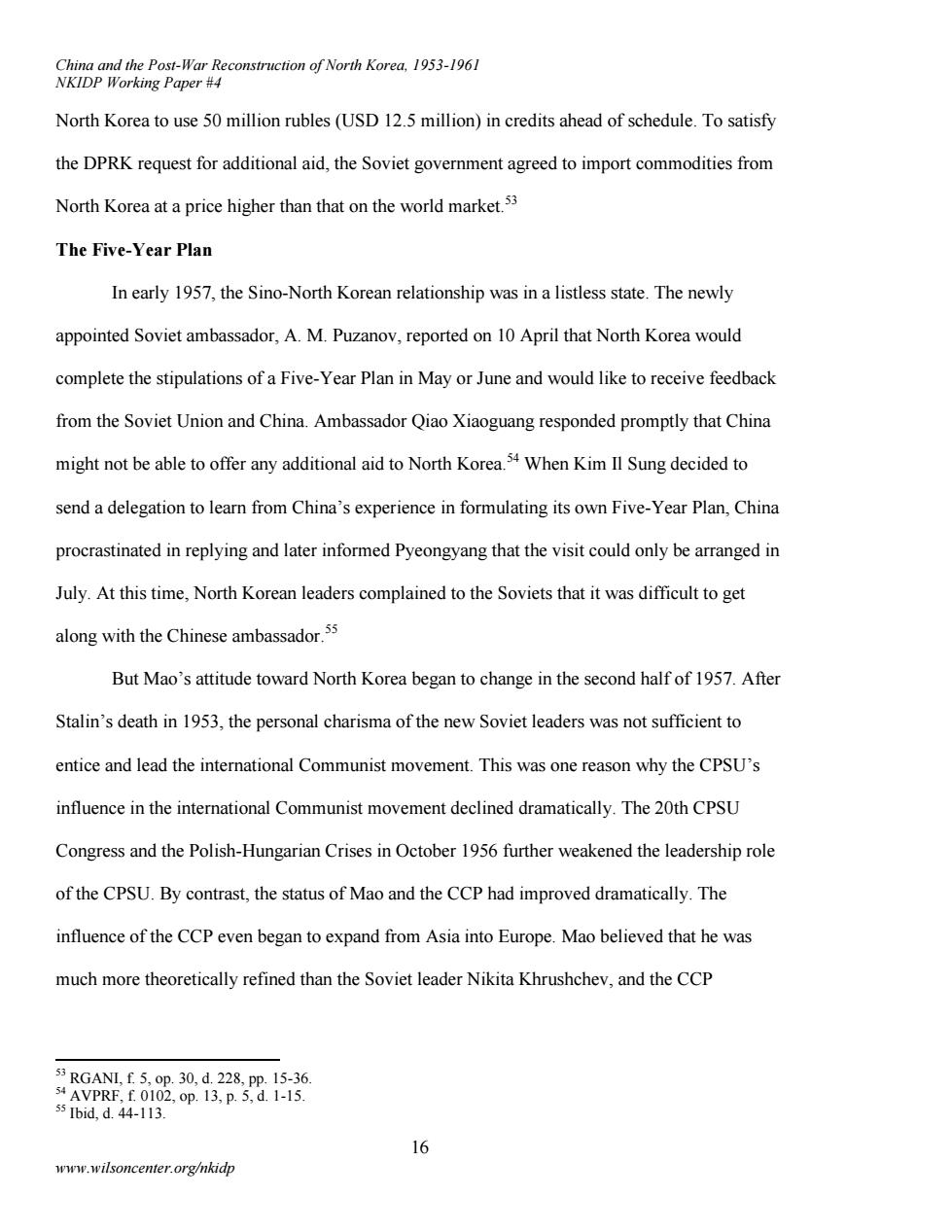
China and the Post-War Reconstruction of North Korea,1953-1961 NKIDP Working Paper #4 North Korea to use 50 million rubles(USD 12.5 million)in credits ahead of schedule.To satisfy the DPRK request for additional aid,the Soviet government agreed to import commodities from North Korea at a price higher than that on the world market.53 The Five-Year Plan In early 1957,the Sino-North Korean relationship was in a listless state.The newly appointed Soviet ambassador,A.M.Puzanov,reported on 10 April that North Korea would complete the stipulations of a Five-Year Plan in May or June and would like to receive feedback from the Soviet Union and China.Ambassador Qiao Xiaoguang responded promptly that China might not be able to offer any additional aid to North Korea.54 When Kim Il Sung decided to send a delegation to learn from China's experience in formulating its own Five-Year Plan,China procrastinated in replying and later informed Pyeongyang that the visit could only be arranged in July.At this time,North Korean leaders complained to the Soviets that it was difficult to get along with the Chinese ambassador.55 But Mao's attitude toward North Korea began to change in the second half of 1957.After Stalin's death in 1953,the personal charisma of the new Soviet leaders was not sufficient to entice and lead the international Communist movement.This was one reason why the CPSU's influence in the international Communist movement declined dramatically.The 20th CPSU Congress and the Polish-Hungarian Crises in October 1956 further weakened the leadership role of the CPSU.By contrast,the status of Mao and the CCP had improved dramatically.The influence of the CCP even began to expand from Asia into Europe.Mao believed that he was much more theoretically refined than the Soviet leader Nikita Khrushchev,and the CCP 53 RGANI,f5,op.30,d.228,pp.15-36 4 AVPRF,f0102,op.13,p.5,d.1-l5. 55Ibid,d.44-113. 16 www.wilsoncenter.org/nkidp
China and the Post-War Reconstruction of North Korea, 1953-1961 NKIDP Working Paper #4 16 www.wilsoncenter.org/nkidp North Korea to use 50 million rubles (USD 12.5 million) in credits ahead of schedule. To satisfy the DPRK request for additional aid, the Soviet government agreed to import commodities from North Korea at a price higher than that on the world market.53 The Five-Year Plan In early 1957, the Sino-North Korean relationship was in a listless state. The newly appointed Soviet ambassador, A. M. Puzanov, reported on 10 April that North Korea would complete the stipulations of a Five-Year Plan in May or June and would like to receive feedback from the Soviet Union and China. Ambassador Qiao Xiaoguang responded promptly that China might not be able to offer any additional aid to North Korea.54 When Kim Il Sung decided to send a delegation to learn from China’s experience in formulating its own Five-Year Plan, China procrastinated in replying and later informed Pyeongyang that the visit could only be arranged in July. At this time, North Korean leaders complained to the Soviets that it was difficult to get along with the Chinese ambassador.55 But Mao’s attitude toward North Korea began to change in the second half of 1957. After Stalin’s death in 1953, the personal charisma of the new Soviet leaders was not sufficient to entice and lead the international Communist movement. This was one reason why the CPSU’s influence in the international Communist movement declined dramatically. The 20th CPSU Congress and the Polish-Hungarian Crises in October 1956 further weakened the leadership role of the CPSU. By contrast, the status of Mao and the CCP had improved dramatically. The influence of the CCP even began to expand from Asia into Europe. Mao believed that he was much more theoretically refined than the Soviet leader Nikita Khrushchev, and the CCP 53 RGANI, f. 5, op. 30, d. 228, pp. 15-36. 54 AVPRF, f. 0102, op. 13, p. 5, d. 1-15. 55 Ibid, d. 44-113